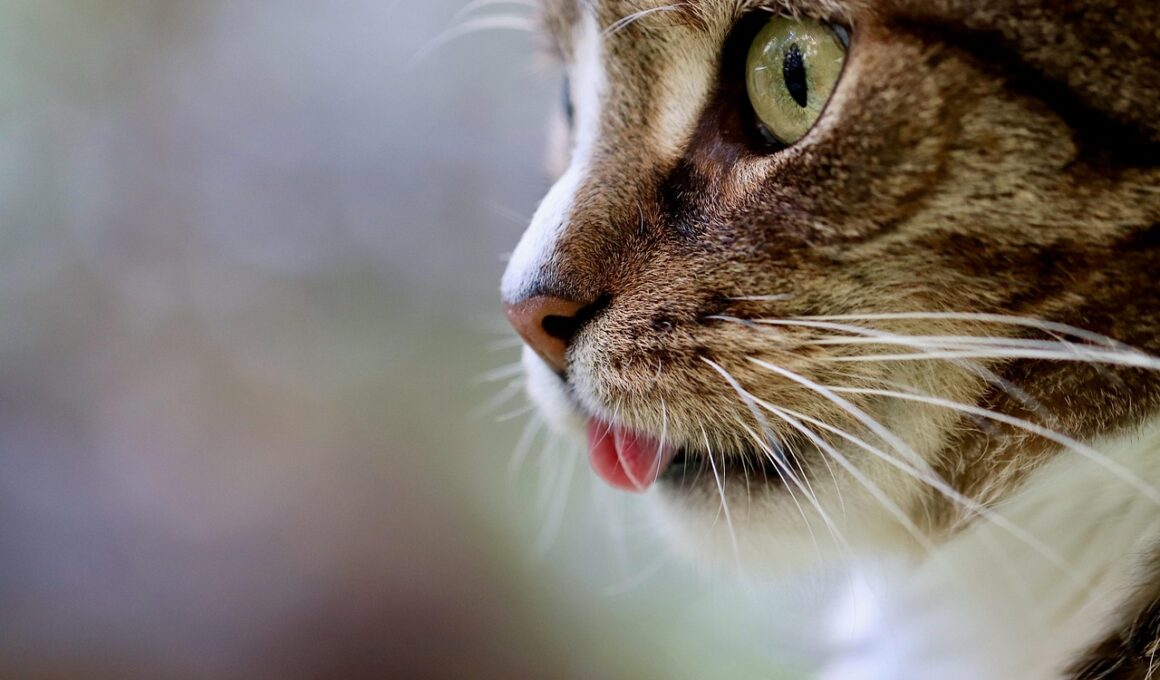Safe Weight Loss Goals for Senior Cats
As our feline friends age, maintaining a healthy weight becomes crucial for their well-being. It’s pertinent to understand the specific weight management needs of senior cats to ensure a quality life. An ideal weight for senior cats directly influences their mobility, overall health, and longevity. Obesity can lead to serious health issues like diabetes and arthritis, which can severely impact a senior cat’s quality of life. Hence, setting safe weight loss goals for these cats is essential. Transitioning them slowly to a healthier weight by managing their diet and increasing physical activity can positively influence their health metrics. As a cat owner, being aware of body condition scores can be quite beneficial. These scores help indicate whether your cat is underweight, at a healthy weight, or overweight. A vet can assist in determining the appropriate weight loss goal tailored to your cat’s individual needs efficiently. Gradual weight loss goals are recommended, typically at around one percent of body weight per week. Patience is key throughout this process for your beloved feline friend to adjust and adapt with a supportive strategy.
Understanding Senior Cat Nutrition
Feeding a senior cat properly is crucial for effective weight management as they age. As cats grow older, their metabolism slows down, requiring a review of their dietary habits. Choosing high-quality, balanced cat food is paramount. Look for options that specifically cater to senior cats. These foods often have reduced calories while being rich in essential nutrients. For instance, high protein levels support muscle maintenance, which is vital for seniors who tend to lose muscle mass. Additionally, fiber-rich foods help manage weight while ensuring satiety. Mealtime frequency can also be adjusted; providing smaller, more frequent meals may prevent overeating. It’s important to keep treats to a minimum and choose healthier varieties to maintain caloric intake effectively. Always ensure that fresh water is available as it supports healthy digestion and hydration. Consulting with a veterinarian to formulate a specific dietary plan catered to your cat’s needs will be beneficial. Regular monitoring of progress with adjustments to meal offerings based on weight changes can help align nutrition with weight loss goals. Thus, a strategic and informed approach to senior cat nutrition is vital for successful weight management.
Implementing a regular exercise routine is equally important in achieving weight loss for senior cats. Unlike younger cats, seniors may not be as active due to age-related limitations. Therefore, creating stimulating yet manageable activity plans can encourage your senior cat to increase its activity levels. Engaging your cat in gentle playtime is ideal; this may include using feather wands, laser pointers, or small toys that encourage light movement. Outdoor activities can also be beneficial if your cat is an explorer. Supervised outdoor time can provide both physical activity and mental stimulation. Senior cats can benefit from shorter play sessions interspersed throughout the day, allowing consistency without overwhelming them. Additionally, scratching posts and climbing trees can encourage your cat to stretch and engage its natural instincts. It’s essential to find activities that your cat enjoys. Remember to always observe your pet’s tolerance to new activities and any signs of fatigue. Each cat is unique, and adapting activities to your feline’s preferences will encourage a positive experience while promoting a healthier lifestyle.
Monitoring Progress and Health
Tracking your senior cat’s weight and overall health during its weight loss journey is crucial for success. Create a system to record your cat’s weight regularly, perhaps weekly or monthly, to identify trends over time. Adjustments to the diet or exercise routine can then be made depending on the collected data. Engaging with a veterinarian is key in this phase; they might suggest regular check-ups to assess not just weight but health markers such as blood tests for diabetes or kidney function. Understanding the importance of these assessments in conjunction with weight management is vital as it ensures that the weight loss process is safe and effective. Additionally, maintain close observation for behavioral changes or signs of discomfort while they are following a new routine. Such signs may indicate the need for immediate modifications. Identifying the right balance between weight management and maintaining quality of life for your senior cat is paramount. Stress during this adjustment can lead to negative effects; therefore, a gradual approach towards monitoring and modification is recommended. A supportive environment, coupled with regular check-ins with a veterinarian, sets the foundation for a successful weight loss journey.
Integrating treats into a senior cat’s weight management plan can be a challenge but can be done successfully with healthy options. Cats naturally love rewards, and choosing the right treats can make a significant difference in their overall caloric intake. Opt for low-calorie treats formulated specifically for weight management when treating your senior cat. Homemade treats could also be an alternative; cooked chicken or fish in small quantities can serve as powerfully motivating rewards without excessive calories. Always ensure that the total calorie count from treats does not exceed 10% of their daily calorie intake. Moreover, it’s essential to read labels carefully to avoid misleading claims on the packaging. Additionally, innovative enrichment methods can replace traditional treat-giving. Interactive toys that dispense food or treats can engage your cat mentally while ensuring they are moving rather than being sedentary. Gradual introduction of these new habits supports the overall weight management strategy, aligning both enjoyment and health goals of your cat. Through careful consideration and mindful choices, treats can coexist with effective weight loss plans for senior cats.
Consulting with Professionals
Engaging professionals besides your veterinarian can provide valuable insights into your senior cat’s weight loss journey. Pet nutritionists are specialized professionals with extensive knowledge about dietary needs across different life stages. They can craft tailored meal plans that align with your cat’s specific health issues, weight goals, and preferences. Moreover, behaviorists can assist in creating strategies for addressing weight-related behaviors like excessive begging or food-related stress. Their input can be invaluable when modifying a cat’s diet to reduce caloric intake effectively. Implementing changes under a professional’s guidance ensures a comprehensive approach to weight management. It’s also helpful to join support groups or forums focused on senior cat care for additional tips and shared experiences. Learning from other cat owners helps in discovering unique solutions and strategies they have successfully implemented. Exploring various options can inspire each pet owner to maximize their effectiveness for the unique idiosyncrasies of their felines. As you proceed, always remember to incorporate feedback and adjustments based on professional advice to maintain a sustainable weight loss plan that caters specifically to your senior cat.
Patience and perseverance are essential attributes for anyone managing the weight of a senior cat. This journey may take time and consistency, especially if significant weight loss is desired. As mentioned, remember that the goal should be gradual and sustainable, allowing the cat ample time to adjust to its new habits. Celebrate small victories along the way; notice improvements in your cat’s health, such as increased energy levels or mobility. These adjustments will not only benefit the cat’s weight but also enhance their overall quality of life and engagement with their environment. Adjustments to their weight loss plan may be necessary as they improve; stay alert to how your cat responds to changes in diet or exercise. Moreover, ensuring a comforting living environment with plenty of love and support will bolster morale. Throughout this process, maintain communication with your veterinarian for ongoing assessments and necessary adjustments. It’s vital to remind yourself that achieving weight goals is about promoting health and happiness for your senior cat. Thus, continued commitment combined with flexibility and love will foster a thriving weight management journey for your cherished feline.


